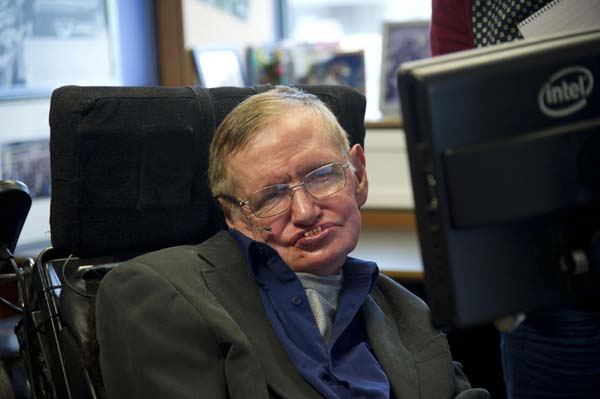LONDON - Stephen Hawking, the British cosmologist who urged people to "be curious" in the Paralympics opening ceremony, has landed the richest prize in science for his work on how black holes emit radiation.
Wheelchair-bound Hawking won $3 million from Russian Internet entrepreneur Yuri Milner, who set up his prize this year to address what he regards as a lack of recognition in the modern world for leading scientists.
 |
|
British physicist Stephen Hawking sits at his desk in the Applied Mathematics Department of Cambridge University Aug 30, 2012 [Photo/Agencies]? |
Alongside Hawking, a second $3 million award has gone to the scientists behind the discovery this year of a new subatomic particle that behaves like the theoretical Higgs boson, imagined almost half a century ago and responsible for bestowing mass on other fundamental particles.
The scale of the awards from the Milner foundation - and being able to give them to multiple recipients for huge projects - could, over time, see them compete in prestige terms with the annual Nobel prizes.
The Nobel committee has had to scale back the size of its awards in line with the performance of the investments which support it. Each prize is now worth $1.2 million, down from about $1.5 million in recent years.
Diagnosed with motor neurone disease at the age of 21 and told in 1963 he had two years to live, Hawking, now 70, has become one of the world's most recognisable scientists after guest appearances on The Simpsons and on Star Trek.
At the opening ceremony of the Paralympic Games in London in August, speaking through his computerised voice system, he said: "Look up at the stars and not down at your feet. Be curious."
He was awarded the Special Fundamental Physics prize for what the committee called his "deep contributions to quantum gravity and quantum aspects of the early universe" as well has his discovery that black holes emit radiation.
"No one undertakes research in physics with the intention of winning a prize. It is the joy of discovering something no one knew before," Hawking said in comments emailed to Reuters.
"Nevertheless prizes like these prizes play an important role in giving public recognition for achievement in physics."
Hawking said he planned to use the money to help his daughter with her autistic son and may buy a holiday home.